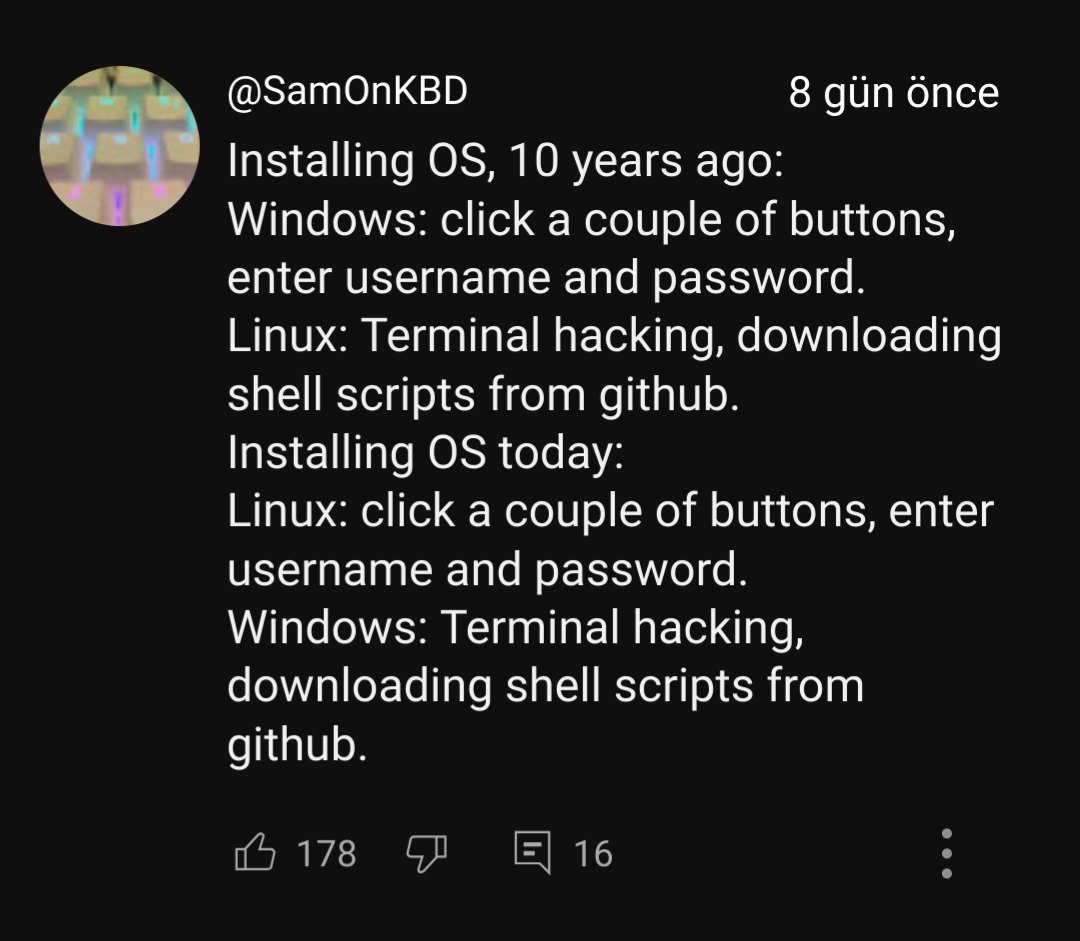this post was submitted on 12 Jul 2024
1799 points (99.0% liked)
linuxmemes
21410 readers
912 users here now
Hint: :q!
Sister communities:
Community rules (click to expand)
1. Follow the site-wide rules
- Instance-wide TOS: https://legal.lemmy.world/tos/
- Lemmy code of conduct: https://join-lemmy.org/docs/code_of_conduct.html
2. Be civil
- Understand the difference between a joke and an insult.
- Do not harrass or attack members of the community for any reason.
- Leave remarks of "peasantry" to the PCMR community. If you dislike an OS/service/application, attack the thing you dislike, not the individuals who use it. Some people may not have a choice.
- Bigotry will not be tolerated.
- These rules are somewhat loosened when the subject is a public figure. Still, do not attack their person or incite harrassment.
3. Post Linux-related content
- Including Unix and BSD.
- Non-Linux content is acceptable as long as it makes a reference to Linux. For example, the poorly made mockery of
sudoin Windows. - No porn. Even if you watch it on a Linux machine.
4. No recent reposts
- Everybody uses Arch btw, can't quit Vim, and wants to interject for a moment. You can stop now.
Please report posts and comments that break these rules!
Important: never execute code or follow advice that you don't understand or can't verify, especially here. The word of the day is credibility. This is a meme community -- even the most helpful comments might just be shitposts that can damage your system. Be aware, be smart, don't fork-bomb your computer.
founded 1 year ago
MODERATORS
you are viewing a single comment's thread
view the rest of the comments
view the rest of the comments

Even 20 years ago Linux was easier to install then Windows.
Last time I recall Linux being tricky was like late 90s.
Giving you, if you were lucky, VESA graphics and maybe a mouse pointer because XFree86 somehow insisted on being told whether you have a PS/2 or USB mouse. 3d acceleration only with nvidia and that required manual installation because nvidia never provided anything but blobs. IIRC ATI drivers were simply non-existent (didn't have an ATI card back then), that only changed when AMD bought them. Whippensnappers won't believe it but once upon the time, nvidia was actually the company to go with when running linux. And Epic didn't hate Linux yet, UT2004 came with linux binaries on the dvd.
I once tried to install Linux around then, not long after ISA cards with Plug n Play became a thing.
Linux: So now to even pretend to get the card to work you have to download and run a tool to generate a config file to feed to another tool so you can then install the driver and get basic functionality from the card (which is all that's available on Linux). Except the first tool doesn't generate a working config file - it generates a file containing every possible configuration your hardware supports hypothetically having and requires you to find and uncomment the one you want to actually use. Requiring you to manually configure the card and thus kinda defeating the point of Plug n Play (though I guess that configuration was in software, not by setting jumpers).
Same card in Windows at the time: Install card, boot Windows. Card is automatically identified and given a valid configuration, built in drivers provide basic functionality. Can download software from manufacturer for more advanced functionality.
That soured me on Linux for a long time. Might try it again sometime soon just to see what it's like if nothing else. ProtonDB doesn't have the most positive things to say about my Steam collection, and I imagine odds are worse for stuff not available on Steam.
Get yourself an old lenovo laptop t440p/t480. You're missing out.
If you ask around or search, you can get answers easily. You can install games from Epic, Ubisoft etc. using other Linux applications.
Like Heroic for GOG And Epic, Lutris for everything else.
Yeah, all my Linux installs after about 2003 were liveCDs. I used to carry my Gentoo CD around as my diagnostic tools for a while helping people fix their windows machines (or just backing up everything off it before reformatting).
I think Knoppix was the first live CD I used. It was mind blowing. Now you can just carry around a whole personally configured system on a USB stick. Pretty cool.
And then you find ventoy...
I was going to say "but ventoy only mounts the filesystem as readonly. Great for testing new distros, but not great for rolling installs you carry with you to use on different computers"
Then I quickly found https://www.ventoy.net/en/plugin_persistence.html, so TIL!
Solid.
good
20 years ago was still xorg.conf times
Have you met Anaconda?
But no, you're right...